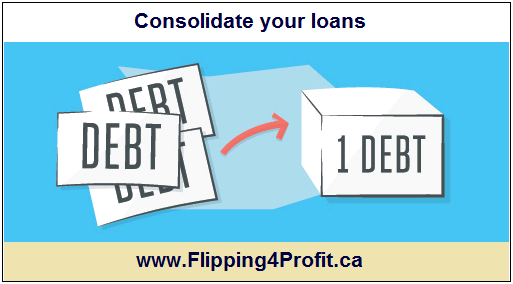If you are struggling to make multiple payments every month for your loans, credit cards, and other debts, then consolidating them into a single payment might be the ideal solution for you. Debt consolidation refers to the process of combining all your unsecured debts into one, with a single monthly payment, and hopefully, with a lower interest rate.
How to consolidate your multiple debts:
The first step is to assess your current debts, their interest rates, and the monthly payments you make for them. You can do this by creating a list or a spreadsheet that includes the creditor, the type of debt, the present balance, and the interest rate. Once you have a clear picture of your outstanding debts, you can consider the following debt consolidation options:
Debt consolidation loan:
You can take out a personal loan from a bank, credit union or an online lender to pay off all your debts. This way, you can consolidate your multiple debts into one monthly payment at a fixed interest rate. However, you need to have a good credit score to qualify for the loan with favorable terms and conditions. Also, you need to make sure that the interest rate of the new loan is lower than the combined interest rate of your current debts. Otherwise, you will end up paying more interest over time.
Debt management plan:
You can enroll in a debt management plan offered by a credit counseling agency. This program involves a credit counselor negotiating with your creditors to reduce your interest rates and installment payments. You make one monthly payment to the credit counseling agency, and they pay your creditors on your behalf. Debt management plans usually last 3-5 years, and you may have to pay a monthly fee for the service.
Balance transfer credit card:

You can transfer the balances of your high-interest credit cards onto a single credit card with a lower interest rate. This way, you can consolidate your debts into one monthly payment. You need to be careful to read the terms and conditions of the balance transfer credit card, as there may be a balance transfer fee and a promotional period with a low interest rate that eventually increases.
Home equity loan or line of credit:
If you own a home and have equity, you can take out a home equity loan or line of credit to pay off your debts. This way, you can consolidate your debts, and the interest you pay may be tax-deductible. However, if you fail to make the monthly payments, you may risk losing your home.
401(k) loan:
You can borrow money from your 401(k) retirement account to pay off your debts. This way, you can consolidate your debts, and the interest you pay goes back into your account. However, you need to pay the loan back with interest within a specific time frame, and if you leave your job, the loan becomes due immediately.
Other debt consolidation options:

You can consolidate your debts on your own by negotiating with your creditors to reduce the interest rates, seeking assistance from a non-profit debt counseling agency, or using your savings or assets to pay off your debts. However, these options require time, effort, and discipline.
Debt consolidation can be a useful tool to manage your finances and can provide some relief from the burden of paying multiple loans every month. However, it is important to consider all the pros and cons, fees, and interest rates before choosing the debt consolidation option that suits you the best. You need to make sure that you make the monthly payments on time and avoid taking on new debts while you are consolidating your existing debts.
Summary:

Consolidating your debts can help you simplify your finances and potentially save money in the long run. There are various debt consolidation options such as a personal loan, debt management plan, balance transfer credit card, home equity loan, 401(k) loan, and do-it-yourself methods. You need to assess your current debts, credit score, and interest rates before choosing the option that suits your financial situation. Debt consolidation is not a magic bullet, and it requires discipline, financial responsibility, and a long-term perspective to reap its benefits.
